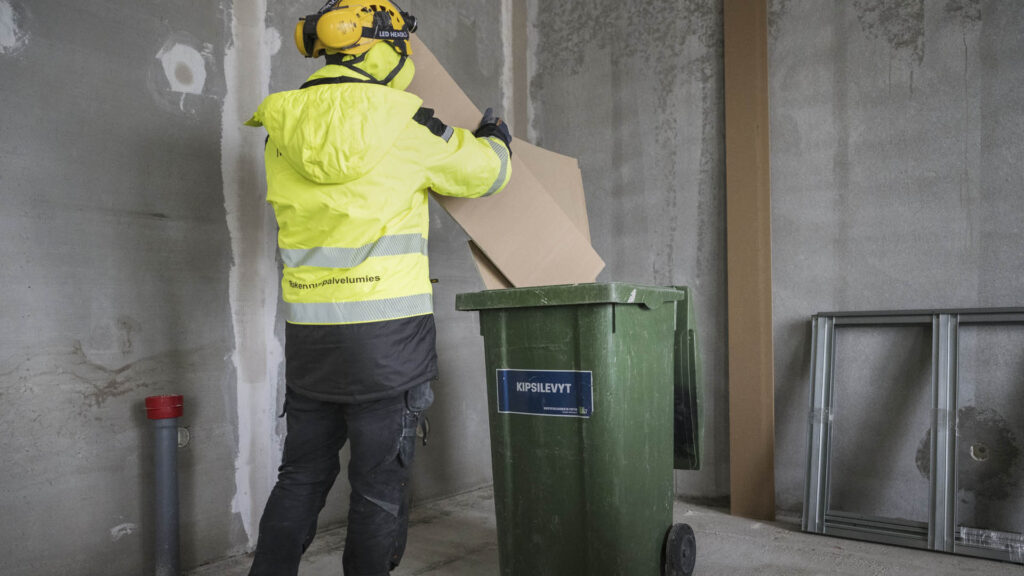The construction industry RT has made a materiality analysis to find out the overall picture of the industry's responsibility and significant responsibility themes from the eyes of stakeholders. The work continues by drawing up an industry-level responsibility program, which aims to reduce the harmful effects of construction and create new opportunities for sustainable business.

This year, we are implementing a responsibility program in which we set goals and define measures and metrics for the development of responsible business operations in the industry. The starting point is the significant responsibility themes in the construction industry, which we have identified through stakeholder dialogue and materiality analysis.
In the materiality analysis, we utilized the double materiality principle, i.e. we took into account the industry's negative and positive effects on each responsibility theme, as well as the economic risks and opportunities for the industry's companies related to the themes.
"Dual materiality is also a procedure according to the Sustainability Reporting Directive (CSRD). With it, the reporting company determines the themes on which it must report. Our member companies can use the work we do at the industry level in their own analysis", the responsible lawyer Ville Wartiovaara says.
The CSRD entered into force at the beginning of this year. In the first phase, it concerns listed companies with more than 500 employees. However, the reporting obligation will expand in the following years to also cover companies in the SME sector.
The views of the member companies guide the work
The materiality analysis we carried out during the fall of 2023 consisted of different work phases: background investigation, mapping of future phenomena, a comprehensive online survey aimed at member companies and external stakeholders, as well as interviews with key stakeholders and an expert workshop.
A total of 124 member companies from all different size categories and different industries responded to the survey. Part of the in-depth interviews also focused on member companies. The representatives of the member companies also form a steering group that will pilot the future responsibility program.
The views of companies operating in the construction industry and external stakeholders differed to some extent. However, there was consensus on the key themes related to responsibility.
In terms of environmental responsibility, climate change, resource use, life-cycle responsibility and innovative construction were screened as essential responsibility themes in the construction industry. In terms of social responsibility, expertise and diversity, as well as the comfort of housing and living, took center stage. In terms of financial responsibility, the most important are sustainable value chains and social responsibility.
The entire value chain of construction is under review
"We look at the entire value chain of construction, from land use planning to construction and all the way to reuse, as well as the wider value network connected to these. In cooperation with different parties, we can promote responsible operating methods of the entire chain of construction", says Ville Wartiovaara.
Concrete actions and comprehensive consideration of the entire spectrum of sustainability are expected from the construction industry.
"Taking over responsibility in the entire value chain is one of the priorities of RT's strategy. Our own role is to support and encourage our member companies in their responsibility work by producing and communicating information, organizing training, indicating direction and influencing regulation. We also bring together companies and other actors to develop responsibility", says Wartiovaara.
The responsibility of the construction industry is exceptionally large
We have already implemented low-carbon and biodiversity roadmaps that show the industry the direction towards carbon neutrality and a nature-positive transition. This spring, we will update the low-carbon road map. In addition, for more than a decade, we have done systematic work to improve occupational safety and prevent the gray economy and work-related exploitation, among other things.
"Now we have formed an overall picture of the responsibility of our industry, all areas of which are important in their own way. As the focus of our responsibility program, we choose strategic responsibility themes where the impact and opportunities of the industry are the greatest and where we can make the most progress", manager Merja Vuoripuro says.
The built environment and construction have an exceptionally great social significance. The share of employed people is 20 percent, of investments 60 percent, and of energy and raw material consumption and emissions about a third.
"When you take into account the seriousness of the climate crisis and the loss of nature, as well as the significant impact of the construction industry on the well-being of the environment, people and the economy, it is a moral necessity for us to reduce the harm caused by our activities and increase the benefits", states Vuoripuro.
Gaia Consulting is a partner in the construction industry RT's materiality analysis and responsibility program. The responsibility program is financed by the TT foundation.
See also
More information

Ville Wartiovaara
Regional Director (ret.), Legal Officer
ville.wartiovaara@rt.fi + 358 40 564 7939Talonrakennusteollisuus ry, Uusimaa

Merja Vuoripuro
Director, Communications and Responsibility
merja.vuoripuro@rt.fi + 358 40 587 2642Confederation of Finnish Construction Industries (CFCI)